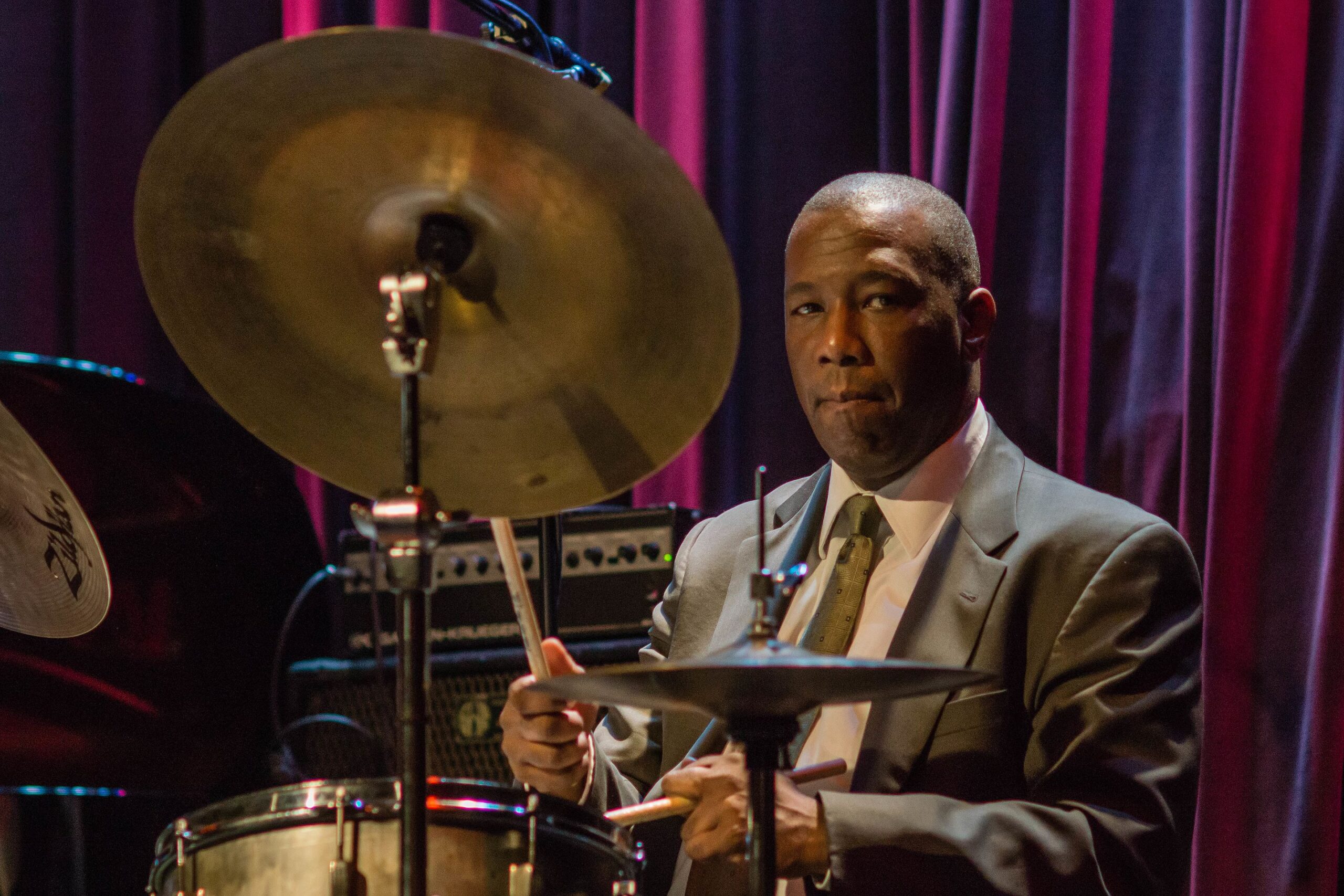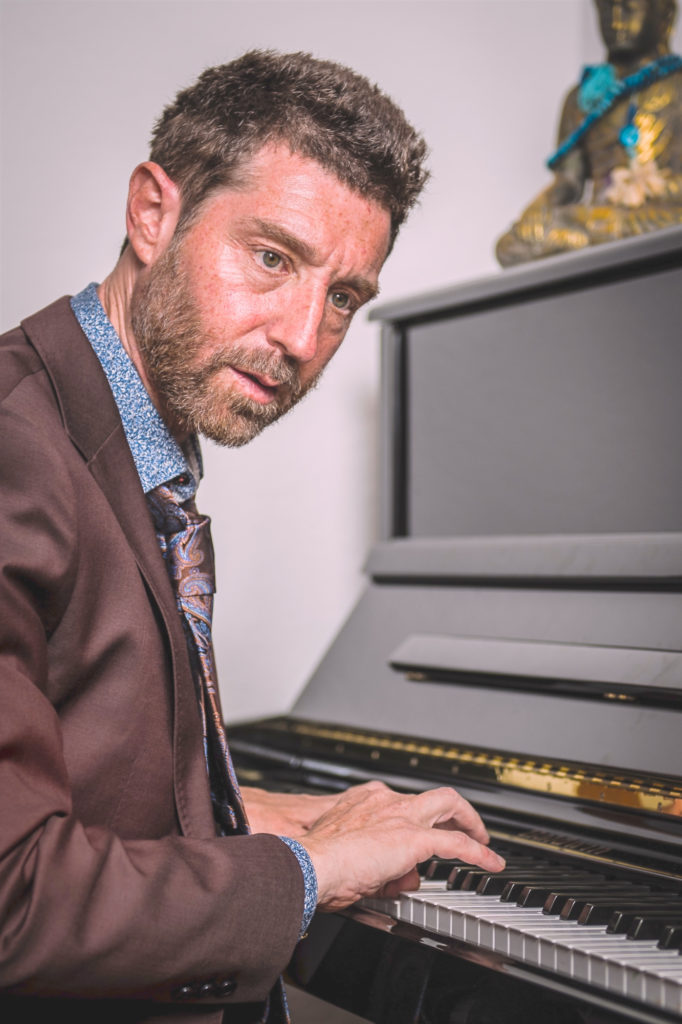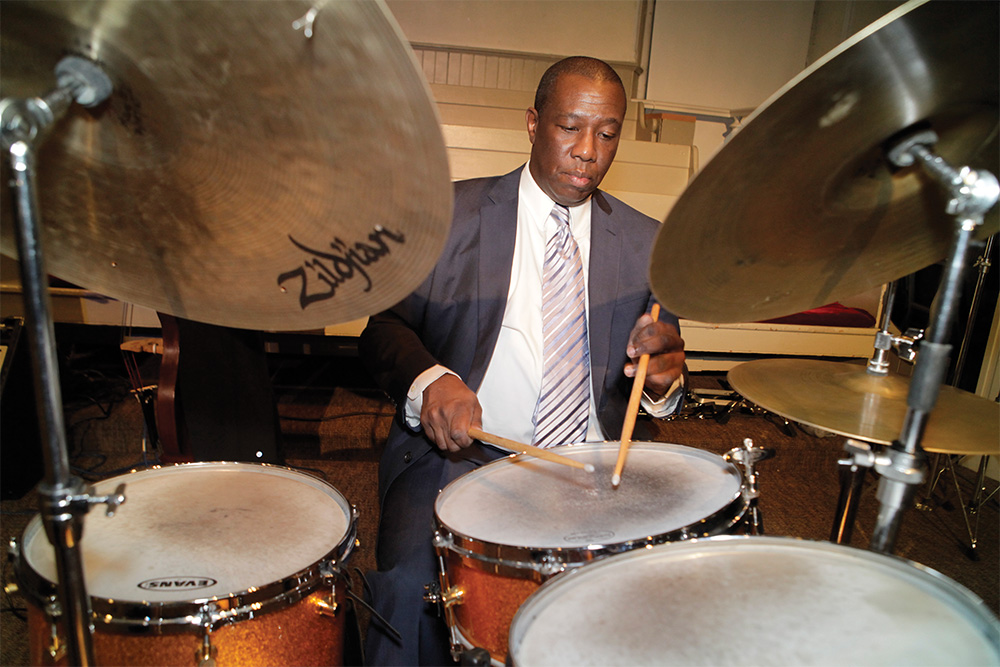By Benny Green
I first heard Kenny Washington playing the drums on Betty Carter’s “The Audience With Betty Carter”, a seminal live 1979 recording from the Great American Music Hall in San Francisco featuring the great John Hicks and Curtis Lundy.

I felt such an energetic fire and presence and sensed a perfect kind of synchronicity between Kenny and the other musicians. I instinctively recognized his overall mastery of his instrument, his embrace and command of the language of Jazz, and especially his teamsmanship in support of the band. Everything that Kenny played was helping his musical family to achieve a home run together. I wasn’t aware of quite how young he was at the time (19), but Kenny’s responsible nature – his devotion to serving the music – was evident to me throughout every dynamic nuance of that double album.
Winard Harper introduced me to Kenny backstage between sets at the Village Gate, where we were performing with Betty. Kenny looked so young and he was slim as a rail – by no means frail, but his frame was noticeably lean and toned like a marathon runner.
Conversationally, he was most engaging and charismatic – a baby-faced authentic New York character who drew me into what became an ongoing sphere of influence, within a few seconds.
Kenny began “holding court” – talking with us about great records with an enthusiasm and impassioned cadence. I remember him expounding at length about “Philly” Joe Jones (whose personal nickname for Kenny was “Mean Streets”) – shaking his head in humility and pronouncing his hero’s name as though the “J’s” were in Spanish – “Philly Yo Yones”.
At the end of our second set, while I sensed that Kenny had been rooting for us all, he’d perhaps overestimated my adolescent stage of musical maturation at the time. I felt that he was a bit underwhelmed and perhaps even a little uncomfortable not being able to deliver some form of “nice job” in good faith. When he said his “goodbyes”, it felt just mildly awkward to this kid who was accustomed to pats on the back at the time, simply for looking as young as I did. I inferred that he’d anticipated hearing and welcoming a hipper or more developed player than I actually was, into the extended musical family.
Sometimes you really want to be able to dig a young cat who’s new on the scene – you want to be encouraging, put your best game face on even if they don’t know how to pace and develop a solo or they haven’t learned their melodies better, or they sound like they never listened to Kenny Clarke, you still want to be able to show love. But if they’re lacking vocabulary, or worse yet if they’re jiving and mugging and playing up mannerisms more than being musical, it’s next-to-impossible for a serious artist whose life is rooted in the choosing of notes, to pretend that they dig it.
What I experienced in our first encounter was one essence of Kenny Washington’s musical integrity. He’s as warm and genuine as can be if you’re taking care of biz, but if you’re slacking, he’s not going to pretend – he’ll just back away from dealing with you. No drama nor animosity, but he’ll disengage from a cat who’s not taking care of the music, with zero explanation or fanfare – “Next!”.
As thankfully proved the case for me, being caught in an immature stage of musical development needn’t forecast a cutoff in all future lines of communication between a relative novice and a master – it doesn’t mean that the door between a younger artist and an older one will remain somehow locked henceforth from the day of the kid becoming exposed for their unpreparedness.
I see a kind of Karma in music that if one is about learning and becoming evermore musical in their application, they may very well get a future opportunity to reconnect with another artist in one way or another. If in response to their experiences, they choose to look within and do their honest homework to become a better servant of music, as Ron Carter himself once told me (and if my recall of his words is accurate), “Serious musicians tend to wind-up on the bandstand together at some point”.
The first time I got to play with Kenny was on Ralph Moore’s 1984 debut album as a leader, entitled “Roundtrip”. Kenny was so insightful and helpful to me in the rehearsal and at the session for this record which took place at Rudy Van Gelder’s studio in Englewood Cliffs, NJ. Things about chord voicings, comping, taste, economy, orchestration – Kenny knew that I was a rookie and he had my back throughout that date. What an oracle of a musical resource Kenny is.
As I became a frequent sideman on New York-based small group Jazz records during the early-mid 1990’s, I always looked forward to rehearsals for recording dates with Kenny. His playing felt then as it does now, like a gold-standard of straight-ahead Jazz excellence. Seeking to blend my expressive attitude, sound and feeling with his, always proved most fertile soil for my ongoing development. I’d learn something new and do some growing each time I was around Kenny, and I’d come away from rehearsals, recording sessions and gigs with him as a better player than I was before.
Kenny mentioning and discussing records in a tangential thread of conversation is almost like an uncontrollable “tick” of his – as though he carries so much knowledge which no one owns – more information and musical love than could fill an institution – that he lives with a sort of unspoken need to pass it along.
Over the years I’ve learned that when I know I’ll be spending a few hours in a vehicle or days on a tour with Kenny, I’ll always try to have a notebook and pen at the ready, as he will inevitably drop the names of dozens of albums that I never knew of, and I’ll want to have jotted down at least a few titles from the hang, although it’s virtually impossible to keep up with everything Kenny has to impart.
Along with other archivists such as Dan Morgenstern, Ed Berger and Loren Schoenberg to name a few, Kenny is arguably the most knowledgeable person on the recorded canon of classic Jazz who one could ever hope to encounter. So if one is smart and realizes what Kenny’s absorbed and is ready and happy to share, they’ll do the best they can to listen up and learn something from him.
Once after a rehearsal at Don and Maureen Sickler’s studio on West 28th Street that’s called Second Floor Music (where the cover photos for James Williams’ “Magical Trio” and Mike LeDonne’s “Partners In Time” were shot), Kenny mentioned seemingly randomly, “Do you know of a record called ‘Bags Meets Wes’?” I knew that he was of course dropping a dime for me to check out Wynton Kelly’s touch and comping on that album.

If you’re actually trying to tune-into what a more experienced player offers you, it won’t take too many words on their part to rally you to action. The imperative homework – the lovework is a thing that no one else can do for you – that of studying and ‘shedding.
Beginning in the early ’90’s and for over 25 years, Kenny graced various editions of my trios. He always made mine a better band and left it a hipper musical situation for the next drummer to step into.
Two random memories of Kenny Washington’s greatness as I experienced it through the lens of being a bandleader:
Once in 1995 when Kenny, Ed Howard and I were playing a string of one-nighters in Europe, we entered a museum in which we were to booked to play a matinee concert, to find that the walls of this unique building were all made of thick transparent glass – floor-to-ceiling windows to an outer garden as well as an overhead skylight. Just like any and all other occasions of playing with him, I never once had to ask Kenny to adjust his volume for that entire show. He played the room like a genius.
That’s consummate professionalism – he surveyed the situation, read the room, never complained to the bandleader about the acoustic challenge the unique setting presented, and he made the drums and the trio sound just right – as ever, better than we’d sounded the night before in a completely different performance environment – just impeccable. Ed and I were floored, we were awed, but not in the least were we surprised by Kenny once again exhibiting such sheer mastery.
On another occasion, I came to San Juan, PR with the same personnel, to play at the Heineken Jazz Festival, which is an outdoor festival that was featuring powerful and soulful salsa and dance music on the same bill as my group. When we played my original “Phoebe’s Samba” that night, Kenny had the people – a very large crowd – out of their seats and up on their feet en masse. Young and older alike were dancing, clapping along and singing to our music with great passion and enthusiasm. He played the groove in such a way that it got right to the people of Puerto Rico and kind of made them love us like we were each one of their own. Kenny was a hero to me and to the audience that night, and I’d say that he and Ed made me sound like a million bucks.
Once when we were parting ways after a tour, Kenny said he wanted to give me a present, and asked me to name any Jazz record that I couldn’t find on vinyl, so that he could put it on a digital DAT tape from his collection for me. I asked him for a record that back then was unavailable in digital format – a solo piano album called “Listen To Barry Harris”. The next time I saw him, he handed me this and more musical treasures he thought I should have.
Over the years he’s given me recordings by Billy Kyle, Carl Perkins and many other great pianists. He can’t help it – if you’re for real, if you’re about the music and you’re a nice person, it’s Kenny’s nature to gift you with more music to help you to better yourself through its sources.
As a drummer, Kenny is such a polarizing icon of a generational bridge to the real deal, to the heart and soul of the music, that I’ve found younger drummers either wanting to absolutely “be” him, or else fearfully avoiding him. But what I’ve seen for myself over the past 40 years is that in one way or another, they all answer to Kenny Washington.
Thank you for how you always treated me, dear Kenny. You’re one of the few people who’ve played with me who consistently asks about my mother and sister Phoebe, and you always asked me to send them your regards.
What a special man and how difficult it is to ever put just how special you are to me and to all of us, into words. But I imagine you’d rather I get in the woodshed. Thank you for becoming an undeniable part of my ongoing conscience, dear Kenny.
All thanks to Music.
With love, respect and gratitude from me and my family always.
ARTIST CONTRIBUTOR

Benny Green possesses the history of jazz at his fingertips. Combine mastery of keyboard technique with decades of real-world experience playing with no one less than the most celebrated artists of the last half-century, and it’s no wonder Green has been hailed as perhaps the most exciting hard-swinging, hard-bop pianist to ever emerge from Art Blakey’s Jazz Messengers. Learn more at BennyGreenMusic.com.


